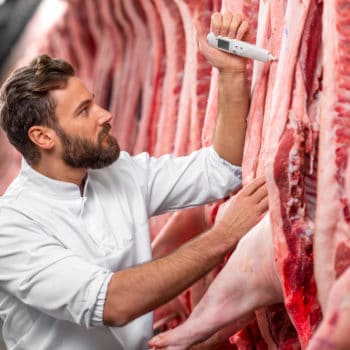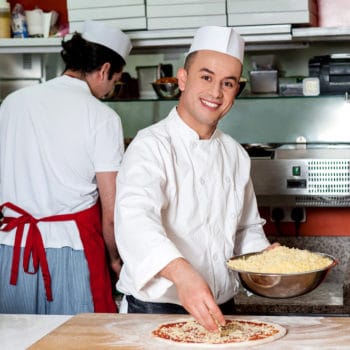Why We Love It
-
$45,920Potential Avg. Salary
-
8.9%Job Growth Rate
-
Growing DemandJob Outlook
-
Fast Paced CareerCareer Attribute
A master or executive chef is the ultimate leader of a kitchen and its staff. His/her role is to ensure exceptional customer service, and that requires menu and recipe creation, staff hiring, training, and management, food ordering, order expediting, and improving workflow processes in the back of house.
Recommended Schools
What is a Master or Executive Chef?
The following job responsibilities are common for individuals in master or executive chef roles:
- Design food menus, create signature recipes, and train chefs on how to prepare and plate dishes
- Manage a kitchen staff, including chefs, sous chefs, cooks, and dishwashers
- Manage a kitchen budget and take budget into account when creating menus, ordering food, and hiring new back-of-house employees
- Supervise food storage, food handling, and kitchen operations to ensure food is fresh, proper safety and handling procedures are being followed, and processes are efficient
A Day in the Life
Master and executive chefs generally work in large kitchens where multiple chefs and sous chefs are needed to prepare food. They may oversee the kitchen in one establishment, or they may oversee kitchens for multiple establishments. Master or executive chefs spend little time cooking orders for customers. Instead, they are kitchen leaders who provide supervision and guidance to all back-of-house employees. Their role is more administrative than those of chefs, sous chefs, and cooks.
Master and executive chefs are responsible for creating establishment menus and the recipes used for preparing food served by the establishment. This process takes into account the taste of the food as well as the cost of the ingredients and the expediency in which menu items can be prepared when ordered. The executive chef is responsible for the overall budget for the kitchen, so many of his/her responsibilities are influenced by budget, including menu creation, hiring, and ordering food.
Master chefs are also responsible for ensuring the kitchen is running smoothly. This may include supervising employees, ensuring food is fresh and stored properly, creating staffing schedules, and hiring new staff members to enable appropriate coverage during busy shifts and special events. Master or executive chefs are ultimately accountable for everything that goes on in the kitchen—and everything that comes out of it—so the role is both fast-paced and one of high-level responsibility.
Typical Work Schedule
Most master or executive chef roles are full-time, and overtime is common. Master and executive chefs may need to be available for any shift—depending on the establishment worked for—and commonly work 12-hour shifts to oversee all kitchen operations over the course of the day.
Projected Job Growth
In recent years, dining out has become a frequent activity for many families, couples, and individuals. This increased popularity of dining out is expected to increase demand for master and executive chefs in the coming decade.
Career Progression
- Early Career: Line Cook, Prep Cook, Short-Order Cook
- Mid-Career: Sous Chef, Chef, Head Chef
- Late Career: Master Chef, Executive Chef
Typical Employers
Executive chefs are hired by large businesses and organizations with food service operations. Master or executive chefs are commonly hired by restaurants, hotels, cafeterias, schools, and businesses that offer dining options to employees.
Recommended Schools
How To Become a Master or Executive Chef
Working as a master or executive chef is often the final step in an aspiring cook or chef’s career, so the process of becoming one can take many years—even decades. Because master chefs must oversee all kitchen operations, experience in each different role within a kitchen allows him/her to understand what’s needed from the kitchen leader and learn about that role through first-hand experience. As such, more experienced executive chefs are often the best leaders when moving into master chef roles.
The first path to becoming an executive chef is to start in entry-level positions and work your way up with promotions over the course of many years. Many executive chefs began working as dishwashers or bussers during or right after high school. If they show talent and dedication, they may be offered the opportunity to train as a prep cook, line cook, or short-order cook. From there, they may receive the opportunity to become a sous chef or chef. After gaining experience as a chef, they may qualify for positions as master or executive chefs in a kitchen.
Conversely, some aspiring executive chefs opt to skip some of the entry-level positions and pursue a culinary degree instead. Culinary degrees are typically two-year programs that teach aspiring chefs how to cook different types of cuisines, how to design recipes, and how to plate food for aesthetic appeal, among other skills. With a culinary degree, aspiring chefs may be able to qualify for sous chef or even chef positions right after graduation, skipping the years working as a cook or dishwasher.
Master or Executive Chef Salary Data
We’ve provided you the following to learn more about this career. The salary and growth data on this page comes from recently published Bureau of Labor Statistics data while the recommendations and editorial content are based on our research.
National Anual Salary
Low Range
$30,840Average
$45,920High Range
$74,170National Hourly Wage
Low Range
$15/hrAverage
$22/hrHigh Range
$36/hrHow do Master or Executive Chef salaries stack up to other jobs across the country? Based on the latest jobs data nationwide, Master or Executive Chef's can make an average annual salary of $45,920, or $22 per hour. This makes it an Above Average Salary. On the lower end, they can make $30,840 or $15 per hour, perhaps when just starting out or based on the state you live in.
Salary Rankings And Facts
#441 Nationally for All Careers
Programs and Degrees
Here are the most common degrees for becoming a Master or Executive Chef. a is usually recommended and specifically a degree or coursework that prepares you for the particular field, see below.
Highest Education Among Master or Executive Chefs
- 0.4% Doctorate
- 1.2% Masters
- 12.3% Bachelors
- 16.9% Associates
- 22.5% College
- 29.2% High School
- 17.6% Less than High School
Job Growth Projections and Forecast
2014 Total Jobs
127,5002024 Est. Jobs
138,800Job Growth Rate
8.9%Est. New Jobs
11,300How does Master or Executive Chef job growth stack up to other jobs across the country? By 2024, there will be a change of 11,300 jobs for a total of 138,800 people employed in the career nationwide. This is a 8.9% change in growth over the next ten years, giving the career a growth rate nationwide of Below Average.
Growth Rankings And Facts
#247 Nationally for All Careers
What Companies Employ The Most Master or Executive Chefs
| Industry | Current Jobs | New Jobs Needed | % Increase |
|---|---|---|---|
| Full-service restaurants | 57,500 | 2,500 | 2% |
| Special food services | 13,400 | 2,000 | 2% |
| Self-employed workers | 6,300 | --- | 0% |














